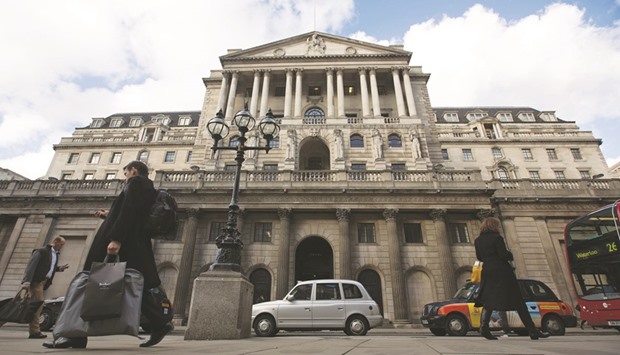Hawks are unlikely to be ascendant at the Bank of England (BoE) anytime soon.
With inflation picking up, and likely to breach the BoE’s target soon, talk is turning to when officials might deliver their first interest-rate hike since 2007. But a Bloomberg News survey shows most economists expect no one to dissent over keeping borrowing costs at a record low until the second half of 2017 at the earliest. A large portion see no vote for an increase until next year.
Governor Mark Carney and his colleagues will provide their latest thinking on Thursday, when they publish their March rate decision. Signs that Britain’s consumer-led expansion is losing steam, the looming start of Brexit talks and continuing budget austerity all support the status quo, according to Commerzbank economist Peter Dixon. He doesn’t see the first vote for tighter policy until at least next year.
“At the moment the hawks are very much in the minority,” London-based Dixon said in a telephone interview. “I get the sense there’s no real push for a rate hike. The likelihood is that the bank will signal it’s going to remain on hold for a considerable time to come.”
All economists surveyed by Bloomberg see the BoE keeping its key interest rate at 0.25% next week, while maintaining their asset-purchase targets at £435bn ($530bn) of government bonds and 10bn pounds of corporate debt. The median forecast in a separate poll is for no change in rates until at least mid-2019. The outlook for UK borrowing costs contrasts with the US Traders are certain that the Federal Reserve will raise its main rate for a third time since the financial crisis on March 15.
They are pricing in a only a 33% probability that the nine-member Monetary Policy Committee will increase its key rate by 25 basis points by year-end. Investors pared their bets after the BoE published its latest economic forecasts on February 2. While officials raised their growth projections, they judged that unemployment can now fall further without generating inflation.
The question is how long they prepared to tolerate inflation going up as the weak pound drives up import costs. Consumer-price growth is fast heading toward their 2% target and is expected by some economists to top 3.5% this year.
Ian McCafferty and Kristin Forbes have voiced concerns and are seen as the most likely to split and vote for a rate increase. They are partly worried about a tight labour market fuelling wage demands, a view bolstered by a report on Friday showing inflation expectations at a three-year high.
For now, such concerns are outweighed by signs that consumers – the engine of the British economy – are starting to feel the squeeze from inflation. Retail sales posted their first quarterly drop since 2013 in the three months through January.
Also hanging over the outlook is Brexit, with Prime Minister Theresa May pledging to trigger divorce negotiations with the European Union this month. The uncertainty of Britain embarking on two years of wrangling risks causing households and consumers to retrench.
“I doubt we will get anyone voting for a rate rise until there is some confidence that there is a strong chance of a decent Brexit deal,” said James Knightley, an economist at ING Bank. “It wouldn’t surprise me that we don’t see anyone voting for a hike until 2019.”

Pedestrians pass the Bank of England building in London. With inflation picking up, and likely to breach the BoE’s target soon, talk is turning to when officials might deliver their first interest-rate hike since 2007.
